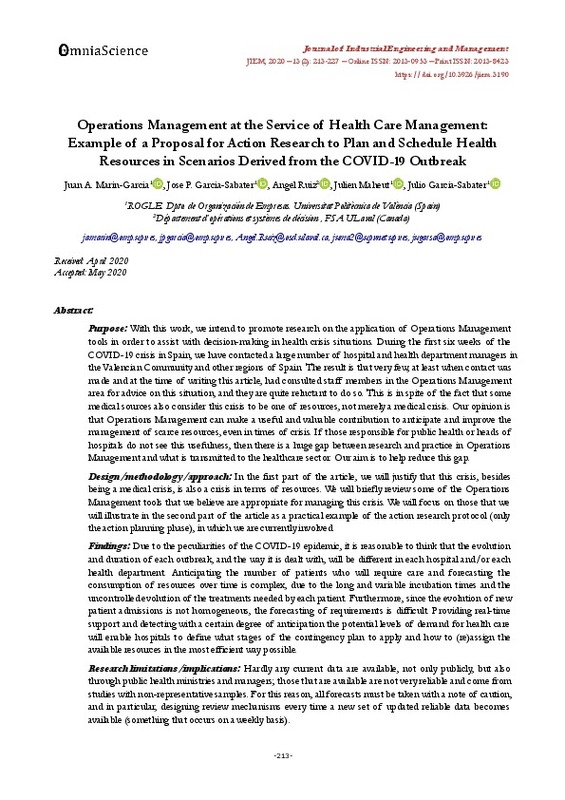JavaScript is disabled for your browser. Some features of this site may not work without it.
Buscar en RiuNet
Listar
Mi cuenta
Estadísticas
Ayuda RiuNet
Admin. UPV
Operations Management at the service of health care management: Example of a proposal for action research to plan and schedule health resources in scenarios derived from the COVID-19 outbreak
Mostrar el registro sencillo del ítem
Ficheros en el ítem
| dc.contributor.author | Marin-Garcia, Juan A.
|
es_ES |
| dc.contributor.author | García Sabater, José Pedro
|
es_ES |
| dc.contributor.author | Ruiz, Angel
|
es_ES |
| dc.contributor.author | Maheut, Julien
|
es_ES |
| dc.contributor.author | García Sabater, Julio Juan
|
es_ES |
| dc.date.accessioned | 2021-03-23T04:31:12Z | |
| dc.date.available | 2021-03-23T04:31:12Z | |
| dc.date.issued | 2020 | es_ES |
| dc.identifier.issn | 2013-0953 | es_ES |
| dc.identifier.uri | http://hdl.handle.net/10251/164055 | |
| dc.description.abstract | [EN] With this work, we intend to promote research on the application of Operations Management tools in order to assist with decision-making in health crisis situations. During the first six weeks of the COVID-19 crisis in Spain, we have contacted a large number of hospital and health department managers in the Valencian Community and other regions of Spain. The result is that very few, at least when contact was made and at the time of writing this article, had consulted staff members in the Operations Management area for advice on this situation, and they are quite reluctant to do so. This is in spite of the fact that some medical sources also consider this crisis to be one of resources, not merely a medical crisis. Our opinion is that Operations Management can make a useful and valuable contribution to anticipate and improve the management of scarce resources, even in times of crisis. If those responsible for public health or heads of hospitals do not see this usefulness, then there is a huge gap between research and practice in Operations Management and what is transmitted to the healthcare sector. Our aim is to help reduce this gap. | es_ES |
| dc.language | Inglés | es_ES |
| dc.publisher | Omnia Publisher SL | es_ES |
| dc.relation.ispartof | Journal of Industrial Engineering and Management | es_ES |
| dc.rights | Reconocimiento - No comercial (by-nc) | es_ES |
| dc.subject | Action research | es_ES |
| dc.subject | COVID-19 | es_ES |
| dc.subject | Discrete event simulation | es_ES |
| dc.subject | Theory of constraints | es_ES |
| dc.subject | Operations management | es_ES |
| dc.subject | Healthcare | es_ES |
| dc.subject.classification | ORGANIZACION DE EMPRESAS | es_ES |
| dc.title | Operations Management at the service of health care management: Example of a proposal for action research to plan and schedule health resources in scenarios derived from the COVID-19 outbreak | es_ES |
| dc.type | Artículo | es_ES |
| dc.identifier.doi | 10.3926/jiem.3190 | es_ES |
| dc.rights.accessRights | Abierto | es_ES |
| dc.contributor.affiliation | Universitat Politècnica de València. Departamento de Organización de Empresas - Departament d'Organització d'Empreses | es_ES |
| dc.description.bibliographicCitation | Marin-Garcia, JA.; García Sabater, JP.; Ruiz, A.; Maheut, J.; García Sabater, JJ. (2020). Operations Management at the service of health care management: Example of a proposal for action research to plan and schedule health resources in scenarios derived from the COVID-19 outbreak. Journal of Industrial Engineering and Management. 13(2):213-227. https://doi.org/10.3926/jiem.3190 | es_ES |
| dc.description.accrualMethod | S | es_ES |
| dc.relation.publisherversion | https://doi.org/10.3926/jiem.3190 | es_ES |
| dc.description.upvformatpinicio | 213 | es_ES |
| dc.description.upvformatpfin | 227 | es_ES |
| dc.type.version | info:eu-repo/semantics/publishedVersion | es_ES |
| dc.description.volume | 13 | es_ES |
| dc.description.issue | 2 | es_ES |
| dc.relation.pasarela | S\421709 | es_ES |








